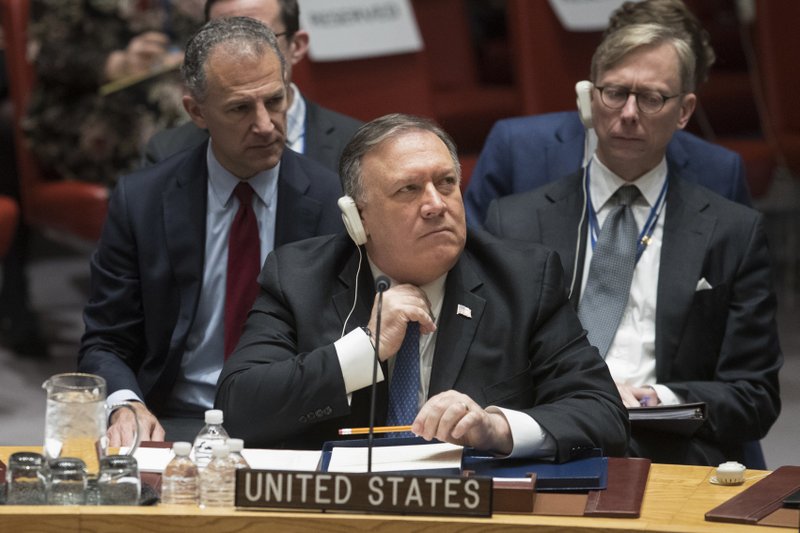UNITED NATIONS -- U.S. Secretary of State Mike Pompeo urged the U.N. Security Council on Wednesday to again ban Iranian ballistic missiles capable of delivering nuclear weapons and to maintain an arms embargo that is scheduled to be lifted in 2020 under the landmark Iran nuclear deal.
He also urged the council to prevent Iran from circumventing existing arms restrictions by authorizing the inspection of ships in ports and stopping them on the high seas.
"Iran's ballistic missile activity is out of control," Pompeo said. "Iran has been on a testing spree and a proliferation spree that must come to an end."
Pompeo spoke at a Security Council meeting on Iran's compliance with the 2015 nuclear agreement that President Donald Trump's administration pulled out of earlier this year and the council resolution endorsing it.
The United States faces an uphill struggle in getting Security Council approval for Pompeo's proposals, especially after U.S. withdrawal from the 2015 nuclear deal, which is still supported by the five other parties -- Russia, China, Britain, France and Germany. The Trump administration's re-imposition in November of sanctions against Iran that it had eased under the nuclear deal has also angered some key council members as well as U.N. Secretary-General Antonio Guterres.
Pompeo criticized the council for weakening the ban on nuclear-capable Iranian missiles that was in effect from 2010 to 2015. The resolution adopted in 2015 to endorse the nuclear deal "calls upon" -- but does not require -- Iran to halt such activity, and it also supports lifting the arms embargo in 2020.
Iran's deputy U.N. ambassador, Eshagh Al Habib, accused the United States of "another series of lies, fabrications, disinformation and deceptive statements" about its ballistic missile program.
He told the Security Council that "Iran's ballistic missile program is designed to be exclusively capable of delivering conventional warheads required to deter foreign threats." He said it has no nuclear component.
Russian Ambassador Vassily Nebenzia said Iran is not banned from conducting ballistic missile launches and there is no proof its missiles are capable of carrying nuclear weapons.
Pompeo accused Iran of building the largest ballistic missile force in the region, one capable of threatening the Middle East and Europe, saying it has more than 10 ballistic missile systems in its inventory or in development and hundreds of missiles. He quoted the head of the Iranian Revolutionary Guard's airspace division, Amir Ali Hajzadeh, boasting Monday that Iran is capable of building missiles with a range beyond 1,200 miles.
"Iran has exploited the goodwill of nations and defied multiple Security Council resolutions in its quest for a robust ballistic missile force," Pompeo said. "The United States will never stand for this. No nation that seeks peace and prosperity in the Middle East should either."
Ambassadors of Belgium, France, Germany, Italy, Netherlands, Poland, Sweden and the United Kingdom said "it has been confirmed that Iran continues to implement its nuclear related commitments."
A Section on 12/13/2018
